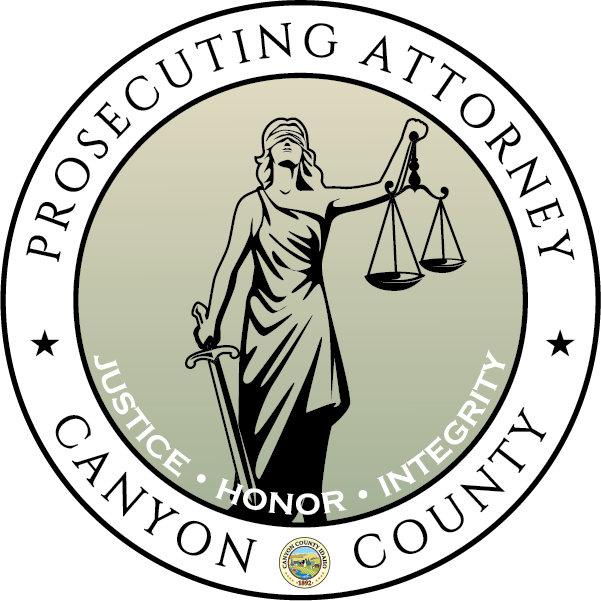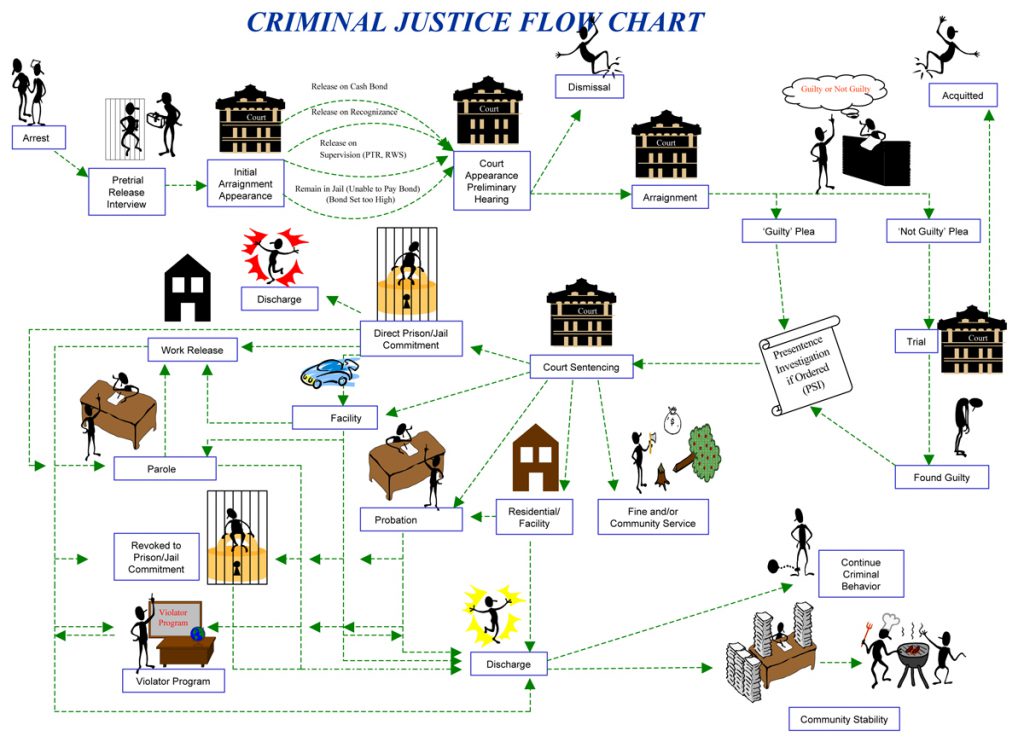The Criminal Justice Process
PROSECUTING ATTORNEYTo an outsider, the criminal justice system may seem daunting. This guide describes, in general terms, how criminal cases are prosecuted in Canyon County, Idaho.
- A Crime is Reported – most criminal cases begin with a law enforcement agency. Cases are investigated by a city police agency, the county sheriff or the Idaho State Police. When a police officer or agency has probable cause to believe that a misdemeanor or felony has been committed, the case is referred to the Prosecuting Attorney’s office.
- Suspect Charged – a person suspected of a crime may be charged in one of two ways. First is through an official Complaint from the Prosecutor’s Office filed with the court. The second is by convening a Grand Jury that makes a charging decision based upon the available evidence.
- Arrest Made or Warrant Issued – once it has been determined that there is probable cause to show that a crime was committed, the investigating agency makes an arrest of the suspect, or the courts will publish a warrant asking for the suspect’s arrest.
- Arraignment – a suspect’s first court appearance is called an arraignment and at this hearing the suspect is allowed an opportunity to plead guilty or not guilty. Also during the arraignment the suspect is notified of the charges they face, what the penalty is for a conviction on those charges and is imposed conditions of release by the arraigning judge. The suspect may post bail themselves at this time, allowing his or her release, or the judge may opt to submit the suspect to the pre-trial release program.
- Court Hearings – after the arraignment, but before trial, there are several court hearings that may or may not occur, depending on the type and severity of the case. These hearings include Preliminary Hearings, Pre Trial Conferences, Motions Hearings, and other hearings as deemed necessary by the circumstances of the case. It is often during these hearings that plea agreements are negotiated and resolved.
- Preliminary Hearing – a hearing to determine if a person charged with a felony (a serious crime punishable by a term in the state prison) should be tried for the crime charged, based on whether there is some substantial evidence that he/she committed the crime. A preliminary hearing is held in the lowest local court (magistrate), but only if the prosecutor has filed the charge without asking the Grand Jury for an indictment for the alleged crime. Such a hearing must be held within a few days after arraignment (presentation in court of the charges and the defendant’s right to plead guilty or not guilty). If the judge finds sufficient evidence to try the defendant, the case is sent to the district court for trial. If there is no such convincing evidence, the judge will dismiss the charges.
- Pre-Trial – A meeting of the prosecutor and the defense attorney held before the court prior to the commencement of actual courtroom proceedings. Generally, the term pretrial conference is used interchangeably with the term pretrial hearing. A pretrial conference may be conducted for several reasons: (1) expedite disposition of the case, (2) help the court establish managerial control over the case, (3) discourage wasteful pretrial activities, (4) improve the quality of the trial with thorough preparation, and (5) facilitate a settlement of the case.
- Public Defender – once arraigned, the defendant may be appointed a Public Defender if they cannot afford an attorney of their own.
- Plea Agreement – often, the Deputy Prosecuting Attorney assigned to the case will offer a plea agreement. A plea agreement requires the defendant to plead guilty in exchange for considerations from the Prosecutor’s Office. Plea agreements are generally offered to the defense attorney or Public Defender assigned to the case, then communicated to the defendant.
- Trial – a defendant is afforded a chance to defend him or herself against the charges laid by the State at a jury trial or court trial. Court trials are for minor infractions and are overseen by a judge. Jury trials include a jury made up of Canyon County residents. For misdemeanor crimes a unanimous jury of six (6) individuals must make a decision. For felony crimes a unanimous jury of twelve (12) individuals must make a decision. The jury makes the final decision on guilt or innocence based upon the evidence presented to them.
- Acquittal – if a defendant goes to trial and is found not guilty, they are considered to be acquitted and may not be charged again for the crimes that they were accused.
- Conviction – when a defendant is found guilty of their crime by a jury or judge, they are considered to be convicted. Convictions may be appealed to a higher court for relief.
- Sentencing – once a defendant has plead guilty or been convicted of the charges against them, sentencing is imposed by a judge. The terms of the sentence will vary based upon the crime type and severity and the defendant’s previous convictions, if any.
Visual Chart of the Criminal Justice Process:
graphic created by Chris Thompson, IA Dept. of Corr.

Address
1115 Albany St
Caldwell, ID 83605
Phone / Fax
P 208-454-7391
F 208-454-7474
Hours
Weekdays 8am - 5pm
(excluding holidays)
